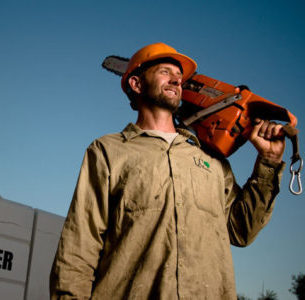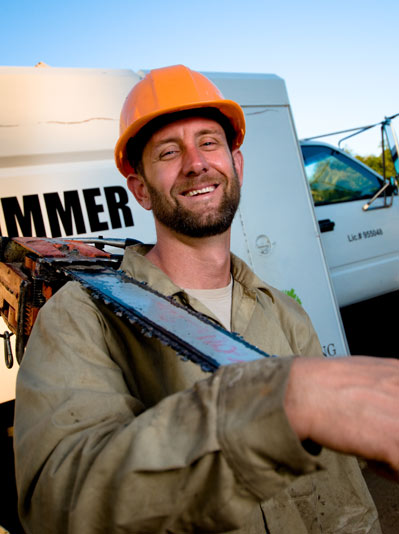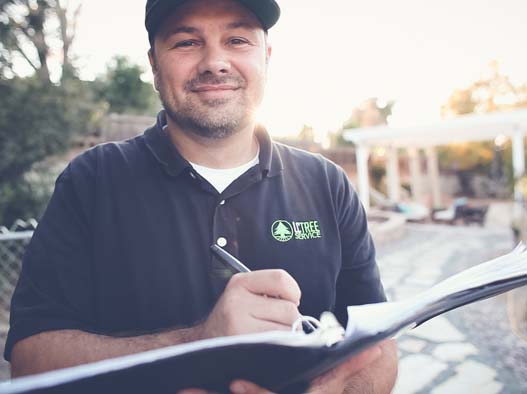




People need the help of a tree service company for a variety of reasons, from a single tree on a residential property that needs a trim, to dozens of trees that need to be removed for a large construction project. Sometimes, you may also have a sick or infested tree that needs treatment, or you may also just require an arborist consultation or arborist report. Whatever the reason, it is important to choose wisely. Trimming and removing trees is extremely dangerous work. Unfortunately, trees get butchered and accidents happen. Trees can sometimes be unpredictable, and not to mention, tree trimmers are working on these towering limbs and trunks with running chainsaws! So what should you look for when hiring a tree service company for your property?
REPUTATION
Is the tree service company that you are considering hiring a reputable one? Do they have good reviews on third-party websites, like Yelp or Google? Yes, this may be biased towards new companies that haven’t had the time to build their online presence, since all companies, including ours, had to start with nothing to show. But when the market is saturated with so many tree care companies to choose from, it’s wise to choose one whose work many people have been pleased with, rather than one that doesn’t possess much of a reputation, so you really don’t know what outcome you’ll be receiving.
It is good to look for reviews outside of a company’s website since they tend to be more trustworthy. Sadly, not all reviews on a company’s website can be trusted as legitimate. We know this first hand because, on more than one occasion, other tree service companies have copied our website content onto their site, including our customer reviews. So, to make a long story short, look to verifiable reviews when you are trying to determine what company to use.
INSURANCE
Choosing a tree service company that is fully insured is one of the most important features that you must consider.
Fact 1. Trimming and removing trees is undeniably dangerous work.
Fact 2. Accidents happen.
If the tree service industry is so precarious, you would think that ALL tree companies would naturally have insurance. But lo and behold, many companies do not! “Why wouldn’t they?” you may wonder. Well, due to the dangers of the industry, insurance rates are extremely high. Some tree business owners simply do not want that high of an expense because if they did have insurance, it would cut drastically into their profits. Therefore, it isn’t always the best idea to settle with the lowest bidder, especially if there is a huge difference between bids.
Here is an example scenario. You need a tree removed, so you collect bids from three different tree care companies.
Company #1 quotes $3,000.
Company #2 quotes $3,500.
Company #3 quotes $1,200.
As you can see, the $1,200 quote that you received from Company #3 is drastically lower than the other companies. Too drastic of a difference! Yes, from a financial standpoint, it is the most appealing. But there is a hidden reason why they can afford to charge so little. It could be that they pay their employees “under the table,” so they don’t have the payroll taxes and all the other expenses that go hand-in-hand with payroll. It could be that they are inexperienced and unknowingly underbid the project — which will not result in a good outcome for them, but also for the customer. We’ll touch on that later in this article. It could also be that they are not insured, so consequently, they do not have the expenses that the other companies have to consider when drafting your quote. It could also be a combination of all the above mentioned. That is just a bad recipe for additional disaster if disaster were ever to hit!
What type of “disasters” could happen on a tree project? The most common mishap would be property damage. Sometimes, even with the most experienced and skilled companies, limbs fall in an unexpected direction, damaging whatever is situated below, such as fences, roofs, sprinklers, landscape, and hardscape. In the worst-case scenarios, a person can get injured or even fatally injured. If anyone is injured on your property, then you, as the property owner, could be held liable IF the injured worker was not covered by insurance. So, please ensure that any tree worker you contract to work on your property is properly insured as a safety precaution for everyone.
LICENSED
Ensure that you hire a tree service company with a license. We’re not just talking about a business license (which they should have also), but a contractor’s license with the state. When you hire a licensed tree company, you are hiring a company that cares to do things right. Would you want to hire a company that doesn’t care to conduct business legally? What does that say about the business owner’s ethics? Many people are not aware that when a business owner applies for a contractor’s license, they are required to be fingerprinted in order for a criminal background check to be conducted. This should give you, as the hiring party, some sense of assurance.
Of course, that’s not to say that all licensed contractors conduct business ethically or that unlicensed contractors all conduct business unethically. Many unlicensed contractors have good intentions to provide great service at the lowest possible price. But unfortunately, there is a lack of accountability. And, it is not unheard of for a contractor to unexpectedly disappear from a partially-completed job — usually because the project was underbid, and it ended up being more difficult or taking much longer than expected to complete. Then, the customer is left with an incomplete job and no contractor left to finish it.
Unlicensed tree trimmers also lack complete insurance. They may possess general business insurance, but in order to qualify for general liability insurance (which is what helps you and the company if property damage is incurred), workman’s compensation, and bonding, you must possess a contractor’s license. All of these precautionary expenses that tree care companies incur are hefty, hefty, hefty! So an unlicensed tree contractor who doesn’t need to deal with them has a huge cost advantage that enables him to provide the lowest bid compared to their licensed and insured counterparts.
AFFILIATIONS
If you have already done some shopping around for a tree service company to work with, you may have noticed that many companies list out organizations that they are registered with. You may have even recognized the same organization logos on different arborists’ websites and/or recognized similar organization initials, such as ISA and TCIA.
ABC…123…what do all these mean? And why should you care?
Hiring a tree care company that has industry affiliations is important because it demonstrates that the company:
- cares to grow in their field, as these organizations provide yearlong resources for learning.
- has a desire to network with other companies, which can help increase their accountability and reputation.
- cares about increasing their knowledge of business operations. This is vital because a business owner who cares about business operations cares about providing great customer service.
The most recognized national arborist organizations are ISA (International Society of Arboriculture) and TCIA (Tree Care Industry Association). A company may also have affiliations with groups outside of the tree industry but pertain to associated industries — such as property management groups, construction and builders groups, and business networking groups. Recognizable companies in San Diego, as well as nationwide, include BOMA (Building Owners and Manager Association) and BIA (Building Industry Association). Why would those non-arborists groups matter? Because if a tree service company has large property management companies and builders on their clientele list, then chances are that they deliver impressive outcomes and possess strong customer service that these companies continue using them.

CREDENTIALS
Now that you’re more familiar with industry affiliations, let’s move on to credentials. ISA, which is the leading arborist organization in the nation, is the same group that grants the credential of Certified Arborist. In researching tree care companies, you may have seen some promoting the title of Certified Arborist — or better yet, ISA Certfied Arborist.
Certified Arborist. ISA Certified Arborist. Is there a difference? No, they’re the same certification because ISA is the only organization in the nation that grants them. So a Certified Arborist is technically also an ISA Certified Arborist.
Hiring a Certified Arborist is different than hiring just any arborist, which is the title given to anyone whose work involves trimming and removing trees, and/or tree health care. Anyone can learn to trim trees through job experience, on-site training, and even through YouTube. But having the credential of being a Certified Arborist means the individual is trained and knowledgeable in all aspects of arboriculture. In order to be granted the title, an applicant must have a minimum of three years of full-time work in the tree industry. A formal exam must also be passed that covers the ins and outs of trees, including topics such as soil management, tree biology, safe work practices, and more.
KNOWLEDGE
Does the tree care company you are considering hiring for your project seem to be knowledgeable about their field? Not everyone in the arboricultural industry actually understands the science involved with trees. This is important because if you’re seeking to have a tree trimmed, for example, it’s important for an arborist to understand the impact that pruning has on trees. How much is a safe amount to prune off? How will trimming certain areas affect the tree’s future growth projection? What season is best or harmful for certain species? For example, if you find a tree trimmer who is open to trimming your pine tree in the summer — keep shopping! That person receives an F in Tree Biology 101! Pine trees should never be trimmed in the summer, and any arborist who knows trees would know that bit of rudimentary information.
Hiring a tree care company that also specializes in tree health care is a feature that is beneficial because:
- You may unknowingly have a tree infested with pests or infected with a disease that the company’s estimator may notice during your estimate.
- Early detection of an infestation or infection is key to saving your tree.
- Tree Health Care Specialists can easily detect signs of common pests and diseases in the area, so the proper diagnosis and treatment can be given.

PROFESSIONALISM
Another important feature to look for in hiring a tree service contractor is the company’s professionalism. Do they present themselves professionally — as an actual business or more of a side gig or one-man show? You could say that this would be a valid “judge a book by its cover” scenario because how a company presents itself speaks volumes on how behind-the-scenes operations are handled. Some tree trimmers that you meet with for a quote may come across as gruff and/or dirty. Not so much of a surprise. It is a tough and messy job. And it doesn’t mean that just because the person you are meeting looks that way, they will do a poor job. Even LC Tree Service started off as a small, one-man show, but Founder, Larry Coalson — even as dirty as he was during estimates — still was able to provide outstanding work for his first set of customers.
If your tree estimator appears as though he just came from a job, it’s because he did. And not only did he already cut down some limbs and trees that day, but he also had to answer phone calls, return phone calls, reply to emails, draft invoices, dump the truck to prepare for the next day’s job, and maybe even do some equipment maintenance. As you can clearly see, this person is busy — not to mention tired — as working in the sun and carrying heavy loads for hours a day takes a toll on just about anyone. So when one person is handling the entire process or at least 90% of it, then it shouldn’t be a surprise when phone calls take a while to return or jobs take an extended amount of time to complete. While all companies could have the occasional slip-up in returning a call or email in a timely manner or take longer than expected to complete a project, companies that employ a team of field workers and administrative staff tend to be more efficient in their performance and customer service since they have more people to help carry the load.
CUSTOMER SERVICE
 Going hand-in-hand with gauging a company’s professionalism, their customer service is still another factor to consider when you start contacting and meeting with different tree care companies.
Going hand-in-hand with gauging a company’s professionalism, their customer service is still another factor to consider when you start contacting and meeting with different tree care companies.
- Were your phone calls and/or emails responded to in a timely manner?
- Were they friendly on the phone or via email?
- Was the estimator friendly and make you feel like you would be taken care of?
- Did you feel like your desires concerning the project and opinion were heard?
After you decide to book your project with a company, the service you receive prior to booking can be reflective of the service you would receive during the job and afterward.


